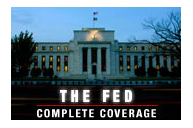A top Federal Reserve official said on Thursday he is seeing fresh signs of a U.S. "housing bubble" and warned about the central bank's ongoing purchases of mortgage-based bonds.
"I'm beginning to see signs not just in my district but across the country that we are entering, once again, a housing bubble," Dallas Fed President Richard Fisher told reporters after a speech in New York. "So that leads me ... to be very cautious about our mortgage-backed securities purchase program."
A mortgage-market bubble in part caused the 2007-2009 financial crisis and Great Recession from which the world's largest economy is still recovering. In response, the Fed has depressed interest rates and is buying $85 billion in assets each month, including $40 billion in mortgage-backed securities (MBS).
Fisher, a vocal hawk on monetary policy, repeated he would not support a reduction in the quantitative easing (QE) program at a Fed meeting later this month in large part because of the fiscal "mess" in Washington.
But citing rising year-on-year house prices in Texas cities, and elsewhere in the country, he warned that the central bank's hyper-accommodative policies could be inflating dangerous asset price bubbles.
RELATED: WHY RISING MORTGAGE RATES WON'T END THE HOUSING RECOVERY
Home resales rose in August and median prices were up 14.7 percent over the previous 12 months, according to the National Association of Realtors, although other data have suggested a sharp rise in mortgage rates has dented the housing recovery.
"We have to be watchful and realize there has historically been an era of the Fed over-stimulating" since the Great Depression, Fisher said.
"I worry we are following that tradition now," he added on the sidelines of a meeting of the New York Economic Club. "No one knows when the bubble pops. But I would argue that ... with each dollar we buy in Treasuries and mortgage-backed securities, we're getting closer to the tipping point."
'KICKING THE CAN'
A frustrated Fed has unleashed three rounds of QE and has promised to keep rates low for a long time to come in order to stimulate the economy, all while tighter fiscal policies and political gridlock have pushed in the opposite direction.
Speaking just hours after President Barack Obama signed off on a last-minute deal to avoid a U.S. default until February, and to re-open the government until January, Fisher said: "kicking the can down the road for a few months will not solve the pathology of fiscal misfeasance that undermines our economy and threatens our future."
The central bank cannot effectively fight high unemployment unless Congress and Obama "get their act together" and fix the nation's fiscal problems, he said in the breakfast speech to the club.
U.S. unemployment remained high at 7.3 percent in August, down from a post-recession peak of 10 percent in 2009. The government shutdown has delayed jobs data for September.
RELATED: THIS SHOCKING NUMBER COULD BE UNEMPLOYMENT IN THE FUTURE
"As long as inflationary expectations are held at bay, we can fully open the monetary throttle in an effort to deliver on the mandate Congress gave us to help achieve full employment," Fisher said. "But it is for naught as long as the fiscal authorities are slamming on the brakes and leaving everyone in the dark as to how they will cure the fiscal mess they have wrought," he said at the end of three days of speeches in New York that focused on fiscal threats to the economy and too-big banks.
The deal approved in Washington late Wednesday reopens the government after a 16-day shutdown. The measure resolves no fundamental differences on spending and taxes that divide Democrats and Republicans.
But it also leaves open the possibility of another government shutdown - and potentially another debt crisis - early next year.
Fisher often blames lawmakers' inaction on resolving long-term U.S. fiscal imbalances for dragging down the economy. Though he has also been a vocal critic of the Fed's massive bond-buying stimulus, Fisher told Reuters on Tuesday he would not urge a reduction in QE at an October 29-30 meeting.
On Thursday, with the fiscal crisis temporarily at bay, he said: "Given all this uncertainty it would be hard for me even to argue a change in course of monetary policy. I don't like the course we're on... but my view will be to stay the course at the next meeting."
Known for his turn of phrase, Fisher compared U.S. lawmakers' willingness to take the nation to the brink of default to a person ready to slit his wrists in a lukewarm bathtub. And, he said, continued Fed bond-buying could actually make matters worse, if the U.S. central bank is seen as an agent of financial "recklessness."
No amount of bond-buying can "offset the rot that is destroying our fiscal house and the blight it spreads over our economy," he said. The Fed will take "all appropriate measures to preserve money market functioning and stability in periods of acute distress."
But any Fed action "to prevent serious disruptions of U.S. dollar funding markets should not be executed in a way that they might be construed to substitute for fiscal redress," he said.
With additional reporting and writing by Ann Saphir of Reuters.




